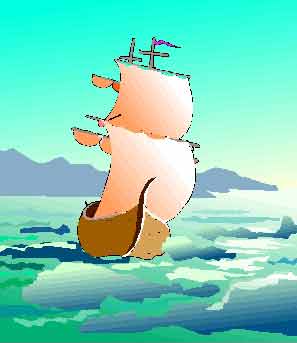
A Matter of Perspective — and Time
By John R. Butler
 |
If you are unlucky (or is it lucky if you are a masochist?), you have known the pain of pulling in and securing a heavy, runaway sail in a driving rain or sleet storm.
Job done, you look down at your fingers, blue with cold, one nail bleeding where it was bent back double. It hurts like sin, but you try, mostly unsuccessfully, to pass it off as if you were Captain Walter Mitty, stoically standing watch with that broken arm.
Yes, it hurts badly, and you gratefully accept your Skipper’s offer of spending the rest of your watch below, waiting for that strong pain pill to kick in.
Expectations were different a hundred years ago: After three hours of battling numbing cold and stinging sleet, and losing one man overboard, the soul-weary men of the British Isles secured the sails and assembled for tots of rum.
Only one of the men spoke: “God almighty, Captain, we’ve had a tough job. Here, look at my bloody fingers —only three nails left!”
That was spoken by a seaman on the full-rigger rounding
Cape Horn 100 years ago during the disastrous winter (May, June and July) of
1905.
For really disastrous storms at sea, we contemporaries may think of the statistics from the Fastnet race of 1979: 303 pleasure/racing yachts with 3,700 men and women started; only 85 (just 28%) finished, five yachts sunk (just 2%) and 15 crew were lost.
One hundred years ago 130 merchant sailing-vessels left European ports to round Cape Horn for Pacific coast ports of North, Central and South America; only 50 (38%) finished, 53 (41%) were never accounted for. I found no statistics on the total number of men lost, but the British Isles (which did successfully double Cape Stiff) lost three men overboard. Starting with only 20 seamen, about half the usual number for a vessel her size (one of the largest in her day), she lost three, five were permanently out of commission due to injuries and severe frostbite, and nine were only occasionally able to perform their duties.
 |
Stories from the Fastnet tell of severe injuries and miraculous evacuations to medical facilities ashore.
Captain Barker, master of the British Isles, had no more medical training than you or I, and only the simplest of medical guides and nostrums. He had already treated a brain concussion with castor oil, then faced the sure death, unless treated, of one of his men. Gangrene was traveling up the seaman’s severely injured leg.
With the assistance of the ship’s Carpenter, the Cook’s meat saw, a large knife and a red-hot poker for cauterizing, he saved the seaman’s life with amputation. No mention of anesthesia, probably just blessed unconsciousness from unbearable pain.
Other than the prescient nature oft attributed to the old professional seamen, how else to explain this statement hours before another seaman was lost overboard? “The weight of the sea is trying to crush my soul.”
pleasure trip for all hands, but they had to endure weeks of being strapped to their beds in the Captain’s Cabin. The ship’s Sailmaker, taking a liking to the small daughter, made her a doll of heavy sail canvas stuffed with oakum.
At the extremely tense moment of an almost successful mutiny, the unlikely act of the child appearing on deck to ask the Sailmaker to repair her doll broke the tension and averted a disastrous mutiny.
As we plan our lake or ocean voyages, hoping for a modicum
of true adventure, just remember the real adventures endured just one hundred
years ago. The good old days? Hardly. Iron men? Indeed!
Cdr Butler retired from the Coast Guard in 1974 after prior Navy enlisted
service, flying SAR in amphibious planes and helicopters on the West Coast,
Philippine Islands, Gulf and East Coasts and Alaska. A desk job in New Orleans
lead him to retire. Always a sailor, he sailed a snipe as a kid, then a variety
of sailboats from the classic Pearson Triton to the capable Montgomery 15. He
crewed on a 102’ schooner in The Tall Ships Race during Australia’s Bicentennial
Celebration in 1988. His present wooden catboat is kind to his increasing age
and physical disabilities, and is thoroughly described at: <http://community.webtv.net/theoldcat/TheOldCat>